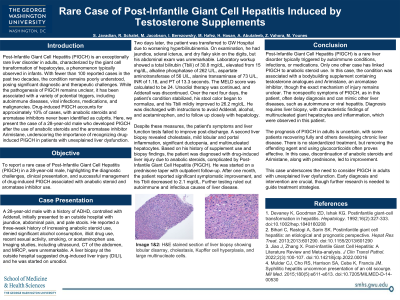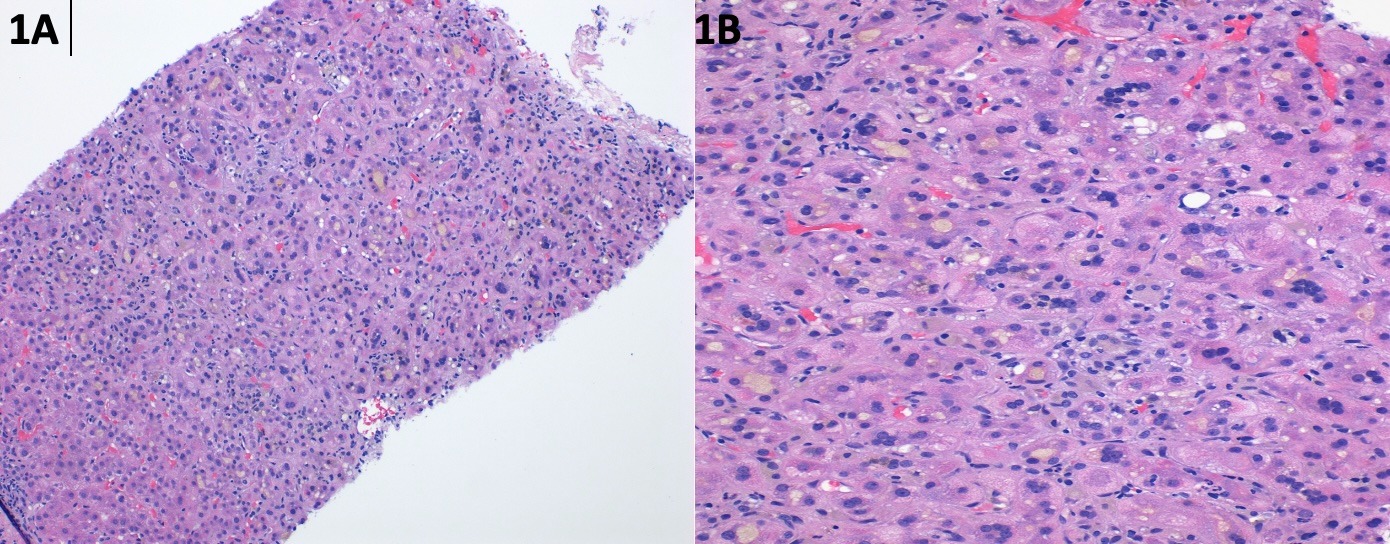Sunday Poster Session
Category: Liver
P1326 - Rare Case of Post-Infantile Giant Cell Hepatitis Induced by Testosterone Supplements
Sunday, October 27, 2024
3:30 PM - 7:00 PM ET
Location: Exhibit Hall E

Has Audio
- SJ
Sam Javadian, BS
George Washington University School of Medicine and Health Sciences
Alexandria, VA
Presenting Author(s)
Sam Javadian, BS1, Reid Schalet, DO2, Matthew P. Jacobson, MS2, Ivan Berezowski, MD2, Mariam E. Hafez, MS3, Syeda Hadia Hassan, MBBS4, Ameer Abutaleb, MD5, Zahid Vahora, MD5, Mamoun Younes, MD5, Stephen Gray, MD5
1George Washington University School of Medicine and Health Sciences, Alexandria, VA; 2George Washington University School of Medicine and Health Sciences, Washington, DC; 3George Washington University School of Medicine and Health Sciences, Watertown, CT; 4Karachi Institute of Medical Sciences, Islamabad, Islamabad, Pakistan; 5George Washington University Hospital, Washington, DC
Introduction: Post-Infantile Giant Cell Hepatitis (PIGCH) is a rare disorder due to giant cell transformation of hepatocytes. We present a case of a 28-year-old male who presented with jaundice and was found to have drug-induced PIGCH due to anabolic steroids and an aromatase inhibitor (Arimistane). This case highlights the challenges of diagnosing and treating PIGCH and the importance of considering this condition in adults with liver disease.
Case Description/Methods: A 28-year-old male with ADHD controlled with amphetamine salts presented to a hospital with jaundice, abdominal pain, and pale stools. The patient reported taking anabolic steroids for weightlifting. He denied heavy alcohol use, recent sexual activity, illicit drug use, or recent acetaminophen use. A biopsy suggested drug-induced liver injury. He was given a trial of ursodeoxycholic acid (UDCA).
Two days later, the patient was transferred to GW hospital due to worsening hyperbilirubinemia. Examination revealed jaundice and scleral icterus. Labs revealed total bilirubin (Tbili) 30.8 mg/dL (increased from 15 at outside hospital), alkaline phosphatase 262 U/L, aspartate aminotransferase 56 U/L and alanine transaminase 73 U/L. The decision was made to continue therapy with UDCA and cessation of amphetamine salts. Stool color began to return to normal and Tbili levels improved to 26.2 mg/dL. He was discharged with close follow up and instructions to avoid amphetamine salts and his anabolic steroid.
After discharge, persistent symptoms prompted a second liver biopsy which revealed multinucleated hepatocytes (Figure 1A-B). The patient was diagnosed with anabolic steroid-induced PIGCH. Three weeks of high dose prednisone followed by a taper resulted in improvement with Tbili 2.1. Outpatient testing ruled out autoimmune and infectious etiologies.
Discussion: PIGCH is a disorder often caused by autoimmune conditions, infections or medications. In our case, PIGCH is suspected to be due to testosterone analogues and arimistane. However, the mechanism of hepatocellular injury remains unclear.
The clinical presentation of PIGCH is nonspecific, often causing a delay in diagnosis. Diagnosis is made through biopsy and histology, revealing multinucleated giant hepatocytes. Treatment involves removal of offending agents followed by administration of glucocorticoids. This case underscores the importance of considering PIGCH in adults with hepatobiliary dysfunction. Further research is needed to enhance our understanding of PIGCH and refine therapeutic strategies.

Disclosures:
Sam Javadian, BS1, Reid Schalet, DO2, Matthew P. Jacobson, MS2, Ivan Berezowski, MD2, Mariam E. Hafez, MS3, Syeda Hadia Hassan, MBBS4, Ameer Abutaleb, MD5, Zahid Vahora, MD5, Mamoun Younes, MD5, Stephen Gray, MD5. P1326 - Rare Case of Post-Infantile Giant Cell Hepatitis Induced by Testosterone Supplements, ACG 2024 Annual Scientific Meeting Abstracts. Philadelphia, PA: American College of Gastroenterology.
1George Washington University School of Medicine and Health Sciences, Alexandria, VA; 2George Washington University School of Medicine and Health Sciences, Washington, DC; 3George Washington University School of Medicine and Health Sciences, Watertown, CT; 4Karachi Institute of Medical Sciences, Islamabad, Islamabad, Pakistan; 5George Washington University Hospital, Washington, DC
Introduction: Post-Infantile Giant Cell Hepatitis (PIGCH) is a rare disorder due to giant cell transformation of hepatocytes. We present a case of a 28-year-old male who presented with jaundice and was found to have drug-induced PIGCH due to anabolic steroids and an aromatase inhibitor (Arimistane). This case highlights the challenges of diagnosing and treating PIGCH and the importance of considering this condition in adults with liver disease.
Case Description/Methods: A 28-year-old male with ADHD controlled with amphetamine salts presented to a hospital with jaundice, abdominal pain, and pale stools. The patient reported taking anabolic steroids for weightlifting. He denied heavy alcohol use, recent sexual activity, illicit drug use, or recent acetaminophen use. A biopsy suggested drug-induced liver injury. He was given a trial of ursodeoxycholic acid (UDCA).
Two days later, the patient was transferred to GW hospital due to worsening hyperbilirubinemia. Examination revealed jaundice and scleral icterus. Labs revealed total bilirubin (Tbili) 30.8 mg/dL (increased from 15 at outside hospital), alkaline phosphatase 262 U/L, aspartate aminotransferase 56 U/L and alanine transaminase 73 U/L. The decision was made to continue therapy with UDCA and cessation of amphetamine salts. Stool color began to return to normal and Tbili levels improved to 26.2 mg/dL. He was discharged with close follow up and instructions to avoid amphetamine salts and his anabolic steroid.
After discharge, persistent symptoms prompted a second liver biopsy which revealed multinucleated hepatocytes (Figure 1A-B). The patient was diagnosed with anabolic steroid-induced PIGCH. Three weeks of high dose prednisone followed by a taper resulted in improvement with Tbili 2.1. Outpatient testing ruled out autoimmune and infectious etiologies.
Discussion: PIGCH is a disorder often caused by autoimmune conditions, infections or medications. In our case, PIGCH is suspected to be due to testosterone analogues and arimistane. However, the mechanism of hepatocellular injury remains unclear.
The clinical presentation of PIGCH is nonspecific, often causing a delay in diagnosis. Diagnosis is made through biopsy and histology, revealing multinucleated giant hepatocytes. Treatment involves removal of offending agents followed by administration of glucocorticoids. This case underscores the importance of considering PIGCH in adults with hepatobiliary dysfunction. Further research is needed to enhance our understanding of PIGCH and refine therapeutic strategies.

Figure: 1A. H&E stained section of liver biopsy showing lobular disarray, cholestasis, Kupffer cell hyperplasia,and large multinucleate cells.
1B. Higher magnification of the first image showing several larger hepatocytes containing multiple nuclei (giant cells).
1B. Higher magnification of the first image showing several larger hepatocytes containing multiple nuclei (giant cells).
Disclosures:
Sam Javadian indicated no relevant financial relationships.
Reid Schalet indicated no relevant financial relationships.
Matthew Jacobson indicated no relevant financial relationships.
Ivan Berezowski indicated no relevant financial relationships.
Mariam Hafez indicated no relevant financial relationships.
Syeda Hadia Hassan indicated no relevant financial relationships.
Ameer Abutaleb indicated no relevant financial relationships.
Zahid Vahora: Abbvie – Speakers Bureau.
Mamoun Younes indicated no relevant financial relationships.
Stephen Gray indicated no relevant financial relationships.
Sam Javadian, BS1, Reid Schalet, DO2, Matthew P. Jacobson, MS2, Ivan Berezowski, MD2, Mariam E. Hafez, MS3, Syeda Hadia Hassan, MBBS4, Ameer Abutaleb, MD5, Zahid Vahora, MD5, Mamoun Younes, MD5, Stephen Gray, MD5. P1326 - Rare Case of Post-Infantile Giant Cell Hepatitis Induced by Testosterone Supplements, ACG 2024 Annual Scientific Meeting Abstracts. Philadelphia, PA: American College of Gastroenterology.
